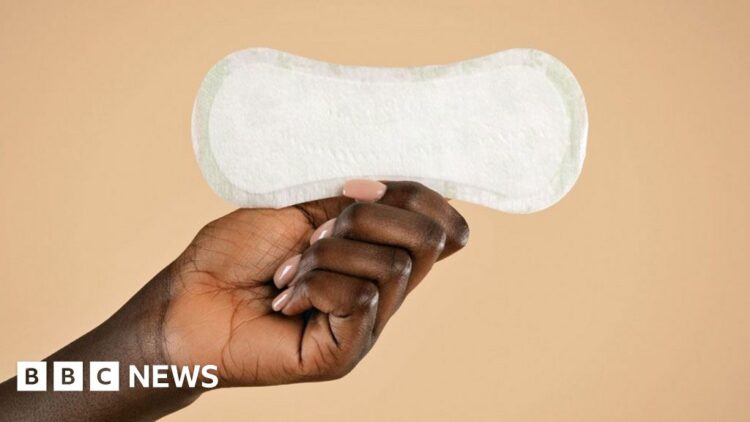Image source, 0077 Multimedia
Image caption, Tamara Magwashu (R) wants to make sure that young women have access to sanitary padsArticle informationAuthor, Gem O’ReillyRole, BBC News
39 minutes ago
A 12-year-old girl in Germany was so touched by the inspirational work of South African period poverty campaigner Tamara Magwashu that she managed to organise a large charitable donation.
Caity Cutter was moved to do something after being shocked to learn from a BBC article about Ms Magwashu that 30% of girls in South Africa did not attend school during their period.
Ms Magwashu has called Caity’s efforts life-changing.
The story, published a year ago, was about how the now 28-year-old from South Africa’s Eastern Cape province was helping girls unable to afford sanitary pads by distributing free ones to schools based in rural, impoverished areas.
Having grown up in a shanty town using rags as sanitary pads – and being bullied for doing so – Ms Magwashu was determined to stop other girls in her community from suffering the same fate.
She created her own business to help girls in the country and beyond.
“I made a choice deep within me that I didn’t want anyone to go through what I did,” Ms Magwashu told the BBC.
“My purpose is to reach every girl who is in need, so they have their dignity. If you deprive a woman of sanitary products it’s a violation of their human rights.”
For Caity, this determination was inspiring – but also an eye-opener.
“I found it really sad that girls my age didn’t have access to clean water, period products and toilets,” she said.
Image source, Michael Cutter
Image caption, Caity Cutter got in touch with Tamara Magwashu when she read about her on the BBC
Ms Magwashu had explained that her family in Duncan Village, a township near the city of East London, shared a public toilet with around 50 other people.
“It’s crazy to me that we are living in a world where people can go to the moon but others don’t have a toilet,” Caity said.
Her father, Michael Cutter, had for some time been saving up money from his job at a biopharmaceutical company and had planned to make a charitable donation.
His daughter convinced him that helping Ms Magwashu’s project was a worthwhile cause.
It was an overwhelming moment for the South African.
“They donated 500,000 pads to help girls from marginalised communities. Then further donations went to us getting a warehouse and hiring staff to distribute the pads further,” she told the BBC.
It all went to help Ms Magwashu’s non-profit organisation, Azosule, the charitable wing of which provides pads for free to schools in the poorest communities. It also sells more affordable, sustainable sanitary products.
Ms Magwashu has negotiated a deal with South African supermarket Makro to stock her sanitary pads in their shops countrywide and in the Democratic Republic of Congo.
Image source, Getty Images
Image caption, Thousands of girls miss many days of education every year because they are on their period
It has been estimated that around seven million South African girls cannot afford to buy sanitary products.
South Africa is just one of many countries facing period poverty.
Globally period poverty affects at least 500 million women and girls, the World Bank has said, leaving them with little access to the facilities they need during their periods.
In August last year the BBC led a pan-Africa investigation into its effects across the continent. It found that women in Ghana on a minimum wage spend one in every $7 they earn on sanitary towels.
But it is not just about the cost and availability of the pads themselves.
Poverty research outfit J-Pal Africa looked into the impact on girls’ education in Madagascar, looking at the lack of knowledge about hygiene practices.
The study included 2,250 schoolgirls in 140 primary and secondary schools.
One conclusion it came to was that after constructing proper washing facilities, as well as providing teacher training and vouchers for free sanitary pads, students’ overall academic skills, memory and attention improved.
Additionally, girls were 17% more likely to advance to the next grade.
Through her interactions with Ms Magwashu, Caity says she also came to understand that providing funding for period products was “only part of the solution”.
Ms Magwashu also sends teams into schools to educate both girls and boys about menstrual hygiene.
Image source, 0077 Multimedia
Image caption, Azosule goes into schools to educate students about menstruation and hygiene
Azosule has been a labour of love for Ms Magwashu, a public relations graduate. She saved money from part-time jobs and her student loan to launch it in 2021.
Originally she did this through what are termed “pad drives” – when you load up a vehicle and travel to poor areas to hand out sanitary products.
But now she can do more with a bigger team.
“With this [donation]we are able to help more schools and are in talks with schools in Congo-Brazzaville , where many girls have never so much as seen a sanitary pad,” Ms Magwashu told the BBC.
She hopes one day this will be continent-wide.
Reflecting on the donation from Germany, Ms Magwashu added: “For once it made me feel seen and heard, because we are talking about someone who comes from privilege who won’t have to go through period poverty.
“When I say that she changed my life completely she truly did.
“Caity will always be a hero of mine. She made a difference not only to my life, but to thousands of girls, so that they don’t have to go through what I went through.”
You may also be interested in:
Image source, BBC/Getty Images
Source link : https://www.bbc.com/news/articles/czrrg0ke4n7o.amp
Author :
Publish date : 2024-06-22 19:16:20
Copyright for syndicated content belongs to the linked Source.
